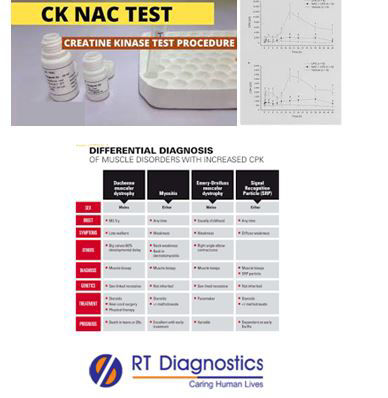CPK – NAC:
Why CPK (NAC) Test?
CLINICAL INFORMATION
CK – Creatine kinase is an enzyme that performs several functions eg. cellular energy metabolism (facilitating storage of energy in the form of phosphocreatine), including enzymatic catalysis of reversible transfer of high-energy phosphate from ATP to creatine (maintaining ATP homeostasis). The main function of CK enzyme is that it catalyzes the reversible phosphorylation of creatine by ATP (physiologically when muscle contracts ATP is converted to ADP) and CK catalyses the re-phosphorylation of ADP to ATP using creatine phosphate as phosphorylation reservoir (Hence CK is also called as CPK i.e creatine phosphokinase - CPK or also as phospho creatine kinase). CK is an iso-enzyme (variants of the same enzyme creatine kinase represented as CK-MM: muscle, CK-MB: heart, CK-BB: brain) that is present in the heart, brain, skeletal muscle, smooth muscles (uterus, placenta intestines, etc), and other tissues. CK in the heart is represented as CKM (M- cells of the Myocytes or heart) and CK present in the brain is represented as CKB (B-Brain cells). High levels of CKM are found in inflammation of the heart muscle (myocarditis) and conditions such as acute myocardial infarction (hypoxic myocardium). While in brain injury or stroke, higher than normal CK-BB levels are found in the bloodstream which helps as an important diagnostic tool for early screening to avoid further complications. The levels of CPK are elevated in injuries or hypoxic conditions (brain or heart) where these enzymes leak from tissue-specific cytosol of the cells into the systemic circulation. Creatine kinase myocardial band (is represented as CK-MB) that arises within hours of heart attack as soon as the heart muscle cells die. The enzyme levels continue to rise for the first 18 to 24 hours and then slowly return to normal after a few days. High levels of these enzymes (according to which tissue site is damaged) are released from the heart or brain during injury or stress to the muscle. Dangerously high CK levels (as seen in rhabdomyolysis ie extensive damage of the muscle cells, conditions like polymyositis that causes inflammation of muscles, strenuous exercise, and/or myopathies i.e muscle diseases) is mostly associated with renal damage (mostly due to high levels of myoglobin) and/or other complications.NAC is N-Acetyl Cysteinein this test is added (substrate) as an activator along with another substrate known as monoclonal antibodies against CK-M ie anti-CK-M. CK-NAC is a reagent set for the determination of Creatine kinase activity in human serum/plasma based on the UV kinetic method.
CPK (NAC) test and/or CPK(MB) test helps to screen as a cardiac marker tool (more specific indicator) to assist diagnose heart diseases such as acute myocardial infarction and also to detect a second or subsequent heart attack and in prognosis. The significance of this test is that during MI, the early hours are considered as the golden hour, and hence early detection by enzymatic assay restores the remaining tissue from further damage causing added complications eg. Cardiac Re-perfusion therapy, etc and restore back its normal activity. Causes of high CK may be due to obesity, convulsions, electric shock, pulmonary infarction, medications such as statins, drugs of abuse like cocaine and alcohol, muscle toxins, muscle trauma, surgery, malignant hypothermia, and postoperative infection, diseases of the thyroid, pericarditis, etc. Symptoms of high creatine phosphokinase-CPK are fever, nausea, confusion or loss of consciousness, garbled or slurred speech, vision changes or loss of vision, pain in muscles, muscle weakness (eg. During muscular dystrophy or inflammation), paralysis, sudden weakness, or numbness in one side of the body. CPK (MB) testis followed by additional tests for other supporting results eg. troponin T and I test (more reliable and highly specific to cardiac tissues), electrolyte tests, BUN, creatinine, urine myoglobin, etc.

General Instructions:
Sample Requirement: Specimen - Blood sample collected from the vein. Test Preparation: None.
NOTE - Sample for specimen collections may vary based on the patient’s condition/cases according to the patient’s presenting complaints/signs or symptoms:
SPECIMEN REQUIREMENT (Special or Rare Cases) - As instructed and guided by Physician / Clinician / Pathologist / as per Laboratory’s requirements, according to procedures and protocols.
Sample Requirement: Blood Sample taken from the vein
Test Preparation: None
This Multi-Specialty Clinical Referral Laboratory RT DIAGNOSTICS provides precise and accurate tests with an extensive range of testing services to the medical centers to help in the diagnosis and identification of pathology in the test specimens for infectious diseases and also to evaluate the function of organ systems of the patient. It prevents further complications and helps to stabilize and restore health to near normalcy at the earliest without delay.



